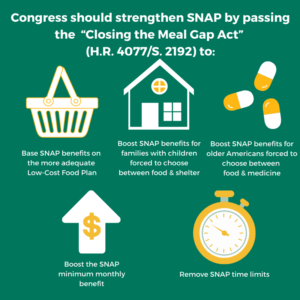December 3, 2021
Households with low incomes face hard choices between paying for food and paying for other basics such as shelter and medicine. Those choices will get even harder for participants when the COVID-19 health emergency ends and, with it, the SNAP Emergency Allotments that have boosted benefits temporarily. Most SNAP participants will lose an average of $82 a month.
A SNAP deductions strategy should be an important part of addressing that looming “hunger cliff.”
Step One: Help Individuals Claim Available Deductions Fully
SNAP caseworkers and others who provide application assistance should work with SNAP participants on reviewing their expenses to identify deductions for which they qualify.
- SNAP participants who need to pay for dependent care for their work, training, or education can receive higher SNAP benefit amounts. The dependent care can be for a child or an adult; care-related expenses range from copayments to transportation.
- Older adults or persons with a disability can receive higher SNAP benefit amounts if they claim a deduction for their out-of-pocket excess medical costs.
- All households also can claim excess shelter expenses. For most households with children, however, the amounts that can be claimed are capped. In fiscal year 2019, nearly 2 million children who lived in SNAP households missed out on additional nutrition benefits because of the artificial cap on the shelter costs the households could claim.
What difference can claiming the full value of a deduction make?
In an example provided by the Massachusetts Law Reform Institute, claiming the dependent care deduction could increase SNAP benefits for a working family with two children from $394 to $589 per month.
Step Two: Improve Federal Policy on SNAP Deductions
In addition, Congress should strengthen SNAP deductions permanently by passing the Close the Meal Gap Act (H.R. 4077/S. 2192).
The bill would
- better calibrate SNAP benefits to households’ actual living costs;
- lift the cap on the SNAP shelter deduction to help more families with children afford to eat; and
- provide a more streamlined mechanism for SNAP participants who are older or live with a disability to pay for food and medicine.

Join FRAC in urging Members of Congress to fight hunger by passing H.R. 4077/S. 2192 now. Send an email or share a social media post using FRAC’s Action Network.


